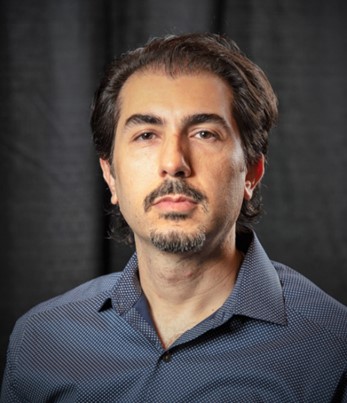
Starting with the last newsletter, we are presenting the success stories of faculty and students in place of the NCESR director’s corner article. Over nearly a two-decade period, with continuous funding support from the Nebraska Public Power District (NPPD), NCESR has funded research in the energy sciences areas that supported many UNL faculty, 753 students which include post docs, graduates, undergraduates and summer interns, and resulted in 599 publications, 35,212 citations and an amazing external funding of $8.3 for every $1 of seed funding! NCESR is currently reviewing Cycle 20 seed funding preproposals.
Dr. Ozan N. Ciftci’s success is presented below. He is the Kenneth E. Morrison Distinguished Associate Professor of Food Engineering in the departments of Food Science and Technology & Biological Systems Engineering with the University of Nebraska-Lincoln.
An international research project led by the University of Nebraska–Lincoln (UNL) is set to transform the future of food by developing sustainable, resilient solutions that address global challenges—while positioning Nebraska as a national and international leader in the emerging bioeconomy/bioindustry sector. This success story begins not with a global grant but a strategic investment made years earlier by the Nebraska Center for Energy Sciences Research (NCESR).
In 2020, our team was awarded support from NCESR through its Cycle 14 program for the project Developing a Green Biorefinery Approach for Rural Processing of High-Value Camelina and Sorghum Co-Products. At the time, we focused on exploring underutilized crops and engineering sustainable processing methods to convert agricultural residues into high-value ingredients and materials. This work catalyzed a powerful interdisciplinary collaboration between my lab and Dr. Ed Cahoon, director of UNL’s Center for Plant Science Innovation. It also helped position Nebraska at the frontier of sustainable food, biomaterial and energy research.
That NCESR-supported effort proved instrumental in laying the scientific and collaborative foundation for what would become Food Innovation and Diversification to Advance the Bioeconomy—FoodID for short—a major international initiative launched in January 2025 and jointly funded by the National Science Foundation (NSF) Global Centers program, Business Finland and the Research Council of Finland. Multiple Finnish food and biotech companies are also involved, developing technologies for practical deployment.
FoodID is a three-year, >$10 million research and innovation hub focused on reimagining food systems through synthetic biology, AI-guided food design, and sustainable bioprocessing. I am honored to lead this initiative, with Dr. Cahoon serving as one of the Co-PIs. The U.S. hub is comprised of UNL, Southeast Community College and North Carolina A&T. The Finnish hub features the VTT Technical Research Centre of Finland (Finnish Hub lead) and the University of Helsinki. These grand challenges cannot be tackled by just one institution or country. That is why we formed a diverse international and transdisciplinary team, drawing on the global expertise and dozens of partners to co-create solutions. FoodID includes partnerships and collaborations with 19 universities and research centers and more than 30 academic and industry collaborators from Canada, Singapore, Sweden, the United Kingdom and Austria. Together, we aim to train a diverse cohort of future leaders, promote global STEM education and foster multi-stakeholder innovation. Our approach emphasizes moving beyond siloed research. Innovative food designs must consider lab success, consumer acceptance, cultural relevance and market dynamics. That is why FoodID involves farmers, consumers, and industry partners from the start.
At its core, FoodID is about use-inspired innovation. We are developing new protein and lipid sources from purposefully designed crops and microbes while addressing environmental, nutritional and social challenges. Research thrusts include plant and microbial food ingredient production; biorefining and processing; affordable and hybrid food design; and evaluating the broader implications of the future food bioeconomy. We leverage AI, automation, and natural variety to enhance food production from seed to system. We aim to develop scalable, efficient methods for fermentative protein and lipid production, engineer novel crops with improved traits, and discover microbial functions useful in food applications.
NCESR’s early investment in our work was not just a project—it was a launchpad. The Camelina and sorghum biorefinery work helped us validate our ideas, build credibility and establish the collaboration that made FoodID possible. In our original NCESR proposal, we even emphasized our long-term goal: to establish a bioprocessing center at UNL. That goal remains central to our vision.
Being selected as a U.S. lead for the NSF Global Centers program is a significant honor. It reflects Nebraska’s excellence in cross-disciplinary, cutting-edge research and demonstrates how forward-thinking support from NCESR can evolve into a transformative global impact.
Now is the pivotal moment for investment in the bioindustry, and Nebraska is uniquely positioned to lead this transformative movement. The shift toward renewable, sustainable, and bio-based products is accelerating globally. FoodID places Nebraska at the forefront of this movement, creating new opportunities for innovation, economic growth and environmental stewardship. This work must advance in tandem with biofuel research to maximize impact.
Ultimately, we hope to translate this momentum into lasting infrastructure: a center for bioprocessing and bioindustry at UNL. This center would bridge academia, industry and government—amplifying the impact of the state’s agricultural strengths and serving as a hub for responsible, innovative and inclusive food system transformation.
Thanks to NCESR, what began as a biorefinery project has grown into a global food innovation movement. This story is a shining example of how strategic seed funding can yield international leadership and help shape a better future.